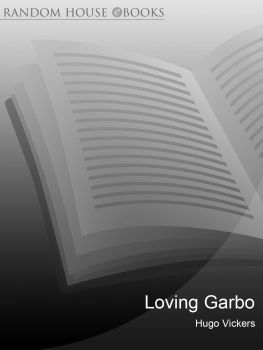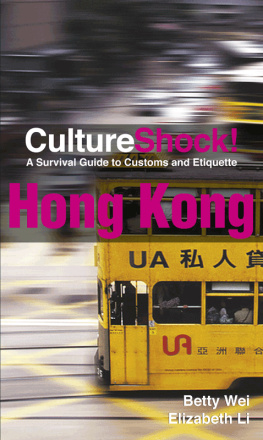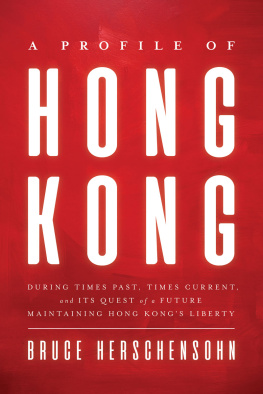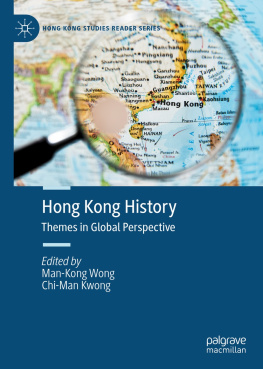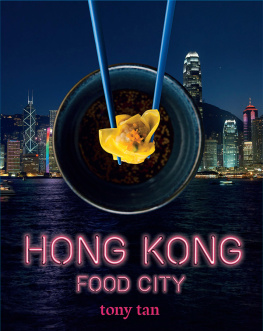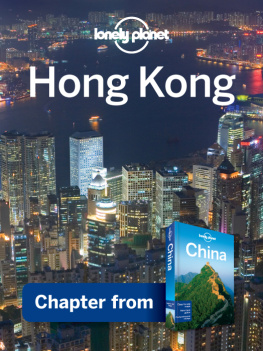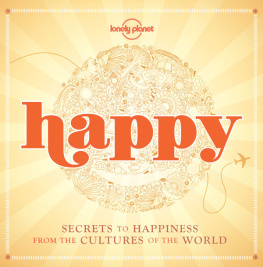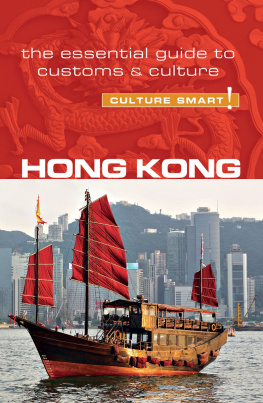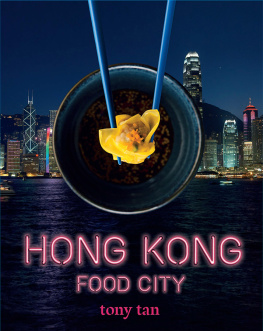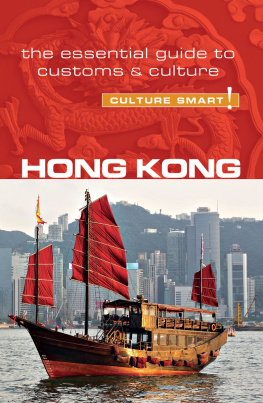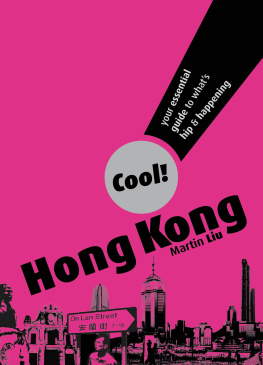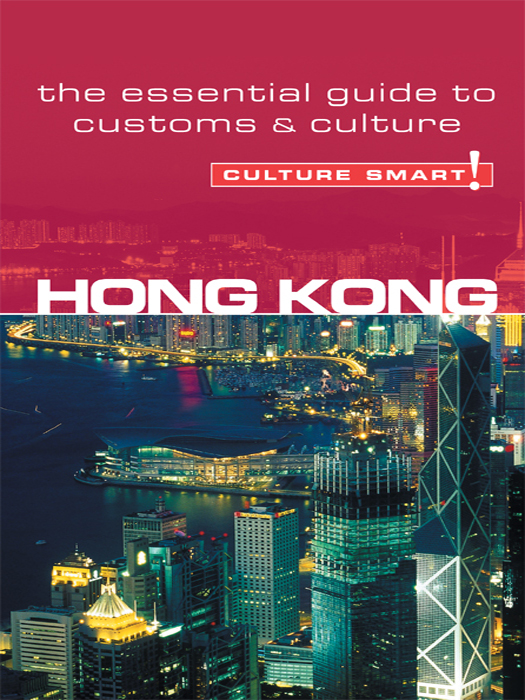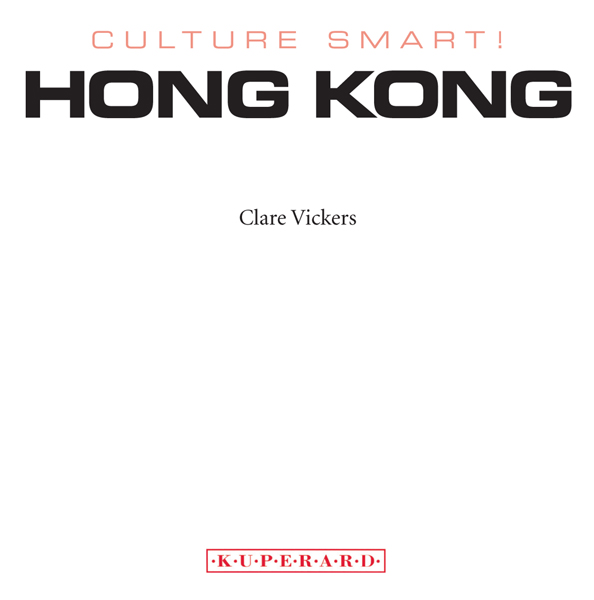eISBN: 978-1-85733-590-3
British Library Cataloguing in Publication Data
A CIP catalogue entry for this book is available from the British Library
Copyright 2005 Kuperard
Revised 2008; fifth printing 2010
All rights reserved. No part of this publication may be reprinted or reproduced, stored in a retrieval system, or transmitted in any form or by any means without prior permission in writing from the publishers.
Culture Smart! is a registered trademark of Bravo Ltd
First published in Great Britain 2005
by Kuperard, an imprint of Bravo Ltd
59 Hutton Grove, London N12 8DS
Tel: +44 (0) 20 8446 2440 Fax: +44 (0) 20 8446 2441
www.culturesmart.co.uk
Inquiries:
Distributed in the United States and Canada
by Random House Distribution Services
1745 Broadway, New York, NY 10019
Tel: +1 (212) 572-2844 Fax: +1 (212) 572-4961
Inquiries:
Series Editor Geoffrey Chesler
Cover image: View from the Peak, Hong Kong Island.
Travel Ink/David Guyler
Brushwork calligraphy on by Bernard Lui
v3.1
About the Author
CLARE VICKERS is an English writer who lived in Hong Kong for eighteen years, from 1979 to 1997. Her husband was a member of the Hong Kong Government, and collaborated with her on the history and government chapters of this book as well as other historical books and articles on Hong Kong. She has a degree in modern languages, and has written several dictionaries and textbooks for Hong Kong schools, had a column in the educational section of the South China Morning Post, and is the author of Escape, a Story of Wartime Hong Kong, written for Hong Kong teenagers. She last worked in the territory in 2004.
The Culture Smart! series is continuing to expand.
For further information and latest titles visit
www.culturesmartguides.com
The publishers would like to thank CultureSmart!Consulting for its help in researching and developing the concept for this series.
CultureSmart!Consulting creates tailor-made seminars and consultancy programs to meet a wide range of corporate, public-sector, and individual needs. Whether delivering courses on multicultural team building in the USA, preparing Chinese engineers for a posting in Europe, training call-center staff in India, or raising the awareness of police forces to the needs of diverse ethnic communities, it provides essential, practical, and powerful skills worldwide to an increasingly international workforce.
For details, visit www.culturesmartconsulting.com
CultureSmart!Consulting and CultureSmart! guides have both contributed to and featured regularly in the weekly travel program Fast Track on BBC World TV.
contents
Map of Hong Kong

introduction
Hong Kong is unique. Its geography and history have given it a surprisingly important role in the world. It is both a primary link for the world to China and the outpost of the West in the East.
Culturally, Hong Kong is rooted in the traditions of China, but there is more than a patina of Westernization. Nearly all the population have come to the territory in the last hundred years, most from southern China, but substantial numbers from the rest of China, from the rest of Asia, and from beyond. They came to a well-run, orderly place and found its comparative stability and the rule of law conducive to the oldest professiontrade.
Trade is everywhere. In addition to the myriad shops and stores, street markets and food stalls operate around the clock. Trade is the lifeblood of Hong Kong, and talk is the oxygen that fuels it.
The Hong Kong people are many and various. The substantial majority are Cantonese, entrepreneurial and industrious people from the farms and villages of the huge neighboring province of Guangdong. They brought with them a varied cuisine that is often acknowledged as the best in China, seeing themselves as the French do in Europe. Their style is open and extroverted compared to the more dignified and serious northerners. Restaurants and shopping malls overflow with families and groups of friends, talking incessantly and missing no opportunity for a bargain. In the unlikely event that a Hongkonger is alone for a few brief moments, he or she will be talking into a cell phone or listening to a walkman. Silence is not a preferred option.
Taking their style from the Cantonese, other settlers from around the world trade and prosper. There are more holidays in the Hong Kong calendar than in any other place in the worldChinese, Western, and Indian. And most holidays are celebrated in the streets or in the parks, out with friends, snacking and having fun.
This guide will give you a quick in to the multifaceted community and way of life of this vibrant territory. You will find helpful advice on business and meetings, and on social etiquette. You will find the confidence to participate rather than observe. In even a short trip, you can be part of the community life of the Hong Kong people. Private life is a different matter. It is something few outsiders ever share, and it is a real privilege if you do become an insider. In this guide, we hope to give you a few pointers to closer access to it.
Key Facts
| Official Name | Hong Kong Special Administrative Region (SAR), China | Cantonese name: Heung Gong. Mandarin name: Xiang Gang |
| Main Cities | Hong Kong (Victoria), Kowloon, Tsuen Wan, Shatin |
| Area | 411.68 sq. miles (1,066.53 sq. km) |
| Terrain | Mountainous to hilly, with numerous rocky islands and a natural harbor |
| Climate | Tropical monsoon. Cool and humid in winter, hot and rainy from spring through summer, warm and sunny in fall |
| Population | Just under 7.5 million | Probably the highest density in the world at 6,250 people per sq. km |
| Ethnic Makeup | 95% Cantonese-speaking Chinese, 5% other |
| Average Age | 34 |
| Life Expectancy | 81.5 years |
| Adult Literacy Rate | 92% |
| Languages | Written: Chinese and English (official); spoken: Cantonese, Mandarin, some English |
| Religion | No official religion: Taoist, Buddhist, 10% Christian, 1% Muslim |
| Government | Special administrative region of China with limited democracy | The Head of Government is known as the Chief Executive |
| Constitution | Hong Kong has its own mini-constitution, called the Basic Law. | The legal system is based on English common law. |
| Per Capita | GDP $29,000 |
| Currency | The Hong Kong dollar HK $1 (pegged at roughly 7.8 to US $1) is divided into 100 cents. |


